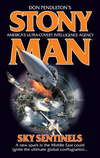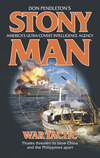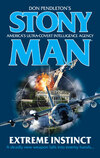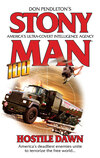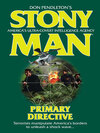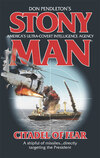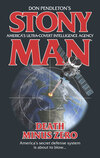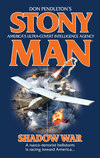Kitabı oku: «Sky Sentinels», sayfa 4
Kohl’s and Jan and Jeni’s Sportwear made up the tips of the other long strip of stores.
“Take her down a little lower,” Lyons told Grimaldi. “I want to get a look at the entrances and exits.”
Grimaldi nodded and dropped the bird in the air, hovering a few feet off the ground and almost directly in front of one of the entrances into Dillard’s. Through the glass, the Able Team leader could see several men with red scarves around their necks looking back at him. As he watched, one of them raised his AK-47 and fired.
But Jack Grimaldi had seen the man, too, and he twisted the chopper slightly in the air, not unlike a boxer sliding off a punch. The 7.62 mm bullet struck the windshield of the chopper and careened off, leaving only a tiny scratch in the glass to show where it had been.
That scratch was directly in front of Carl Lyons’s nose.
The radio suddenly blasted with screeching and scratching. Grimaldi adjusted the squelch as a stern voice said, “KBI-1 to Missouri chopper—whatever your call name is!”
Lyons lifted the radio microphone from where it was clipped below the control panel and said, “Just call us AT,” he said. “AT-1, 2 and 3. I’m 1.”
“Well, whoever you are, get your ass out of there,” said the same KBI voice. “They’ve just called and said if you don’t land or fly away they’ll ignite the whole mall right now!”
“Affirmative,” Lyons said. He nodded at Grimaldi, who immediately raised the helicopter straight up in the air. He glanced down at the mike, as if it might actually be the man he’d just talked to. Whoever the guy was, he sounded as if he was used to being obeyed.
Carl Lyons’s best guess was that KBI stood for Kansas Bureau of Investigation, a state investigative unit. And KBI-1 would undoubtedly be the director.
But he didn’t sound as if he was going to be as easy to get along with as Dwayne Langford had been back at the church.
“AT-1 to KBI-1,” Lyons said into the mike. “What’s your 10–20?”
“We’re set up at the edge of the parking lot, north side,” the surly voice came back. “There’s a place where you can land over here, and I’m ordering you to do just that right now!”
Grimaldi turned to the Able Team leader again. “Want me to land?” he asked.
Lyons nodded. “I’m not sure this clown’s ego could take it if we didn’t.”
Grimaldi laughed and turned the chopper that way.
A few seconds later they were coming down on the asphalt parking lot next to one of the SWAT vans parked around the mall. Lyons saw the same hectic activity that he’d seen outside the church in Oklahoma City, with flashing lights and sirens blaring, with every SWAT team and other unit anxious to get started but not knowing how or where.
As the chopper’s rails met the ground, a man in a dark blue shirt and bright red tie approached with a look of anger on his face. He reached out and opened Lyon’s door with one hand, and would have grabbed the Able Team leader by the arm and dragged him out if Lyons hadn’t intercepted his other hand first. Twisting the man’s wrist into a classic jujitsu hold, the Able Team leader watched the anger on the man’s face turn to a grimace of pain as he exited the chopper on his own.
“Well, we’re certainly off to a great start, aren’t we, Mr. KBI-1?” he said as he finally released the man’s hand.
The Kansas Bureau of Investigation director was too proud to rub his wrist where it had come close to snapping, so he stood upright and at attention as he said, “Okay, you’re under arrest for resisting an officer.” He turned to look at Schwarz and Blancanales as they exited the helicopter behind Lyons. “What happens to you two remains to be seen.” He ran his eyes up and down the blacksuits all three Able Team warriors wore, looking for any trace of a patch or insignia.
But, of course, he found none.
“What in the hell kind of dress-up is that?” he demanded. “Who do you represent, anyway? You’re not Missouri cops. The chief would have called me himself.”
Lyons had faced such irritating bureaucrats throughout his entire former career as a LAPD officer. He had never had any patience for pompous little jackasses like this man then, and if there had been any change in his attitude at all, he had even less now. “I get one phone call, don’t I?” he said sarcastically, pulling the satellite phone from its case on his belt. Quickly he tapped in the number to Stony Man Farm. “Since you didn’t get a call from the Missouri chief, I’ll let you talk to our chief.”
“Right,” said the Kansas director with the same sarcastic tone the Able Team leader had used.
It took less than ten seconds for Lyons’s call to be transferred to Hal Brognola.
The man in the red tie frowned in confusion as he took the phone from Lyons. It didn’t take long for Brognola to read the riot act to the KBI director. “Yes, sir,” was all he said before his face turned red and he handed the instrument back to Lyons.
“Thanks, Hal,” the Able Team leader said, and then disconnected the line again.
“All right,” said the man Lyons knew only as KB-1. “My name is Markham. Bill Markham. What are your plans and how can we help?” The words sounded as if they hurt coming out of his mouth.
“You can give us a rundown of exactly what’s going on,” Lyons said. “Then, unless one of my men or I tell you different, you can stay out of our way.”
CHAPTER FOUR
Iranian president Javid Azria rolled up his prayer rug, nodded to the staff with whom he had shared afternoon prayers and returned to his office, closing the door behind him. Alone and out of sight, he tossed the rug carelessly onto a padded armchair as he moved behind his desk. As he dropped down into his chair, he felt a grin creeping across his face.
The entire United States, including their president, was still in shock. The Americans simply couldn’t fathom the fact that a country such as his own was openly defying and attacking them at will.
And rather than denying the attacks or blaming them on terrorists, Iran was taking credit for them.
Azria opened the humidor on his desk and took out a long, thick, Cuban cigar. Snipping off the end with a tiny guillotinelike cutter, he stuck the cigar in his mouth and picked up the heavy marble lighter on his desk next to the phone. The cigars had been a gift from his most recent ally, and although smoking was forbidden by the Koran, he liked the Cubans and indulged in one every afternoon and another in the evening. The rest of his staff studiously ignored this small transgression on his part.
As he circled the end of the cigar around the flame in front of him, Javid Azria’s eyes caught sight of the painting on the wall to his left. It depicted Cyrus the Great in battle, a long scimitar in his right hand as he beheaded what was obviously a Jewish peasant. The painting was, of course, an artist’s rendition. Photography had still been centuries away when Cyrus had ruled the Persian Empire, so no one really knew exactly what the man had looked like.
Azria was fairly sure he knew, however. He saw Cyrus’s face every time he looked in a mirror.
He was in the process of starting the first real jihad the world had seen since the days of the Crusades. But this war was going to make those of the past look like an American Girl Scout meeting.
Turning the end of the cigar toward his eyes, Azria saw that it had lit evenly and set down the lighter. Contentedly, he puffed away as he awaited an eagerly anticipated phone call. His mind drifted back in time to his college days. He had been a dean’s list student at Yale when the Shah had been dethroned and Ayatollah Khomeini had taken over Iran. And he had not returned until long after that initial regime had taken control of the country. For a while, the theocracy had ruled Iran with an iron fist, beheading offenders of even the smallest Islamic laws just like Cyrus the Great was doing in his painting. But with the Ayatollah’s death, things had gradually loosened up. Students in favor of separating religion from government were now even allowed to demonstrate in the streets. The only thing that had not changed was what he perceived as an almost countrywide hatred of the Jews, and a certain amount of dependence on the United States and other countries in the Western world.
Azria leaned farther back in his chair. It was his mission in life to change all that. He could have felt it in his soul.
If he’d believed in souls.
He was halfway through the long Cuban when the buzzer on his phone finally sounded. “President Azria,” the voice of his secretary said in Farsi. “I have President Gomez on the line for you.”
Azria answered in the same language. “Put him on,” he said.
The Iranian leader pressed the receiver closer to his ear as he heard a click. Then, an accent far different than his own spoke in English—the one language they had in common and therefore the one they always used. Ironically, he thought, it was the language of their common enemy.
“Good afternoon, Mr. President,” said Raoul Gomez, the president of Venezuela.
“And the same to you,” said Azria.
“We have not spoken since your American guests from Iraq arrived in your country,” Gomez said in a lighthearted voice.
Azria laughed, knowing the other man meant the American hostages who’d been kidnapped near the border. “No, sir, we have not,” he said into the receiver. “I believe they are resting at the moment.”
“Yes,” Gomez said. “I sometimes forget that night here is day in your country. An afternoon nap, no doubt?”
“Probably,” Azria said. “They really have little to do but sleep and worry.”
“Very good,” Gomez stated. “I have a ship en route to your country even as we speak. And I trust that the shipment which is coming my way is on schedule, as well?”
“Yes,” Azria continued. “It will arrive quite soon, in fact.”
“Very good again,” Gomez said. “Actually, that was the only reason for my call. Your other actions in America and Israel are having the desired effect, according to my intelligence operatives. The United States is focused on the Pasdarans you snuck across their borders and the hostage situation.” He paused to cough, and Azria realized he, too, was smoking a cigar. Probably the same brand and size as the ones he had sent to the Iranian president.
When Gomez had quit coughing, he added, “The Israelis are being forced to rivet their attention on your increase in suicide bombings. And, in addition to the newsmen hostages, the Americans are focusing on the small strikes of your Pasdarans inside their very borders. These diversions are allowing our true objective to…” He paused for a second, searching for the right words. “To fly under the radar. Yes. I believe that is the slang term the norteamericanos use.”
“If it means my shipment to you and yours to me is going unnoticed, then, yes, I believe you are correct.”
“We must speak again when the ships have arrived,” Gomez said.
“We will,” Azria agreed, and then hung up the phone.
Javid Azria had to draw in hard on his cigar, which had almost gone out during the conversation. But after a couple of weak puffs of smoke, it returned to its former fully lighted state. Azria sat back in his chair again, stuck the cigar between his lips and smiled.
By either confusing or sometimes flat-out refusing to allow U.N. inspectors to do their job in his nuclear plants, he had successfully completed his program and now had several dozen nuclear warheads at his disposal. In addition to that, he was about to broker another deal for F-14 fighter plane parts from another source. There had been a time when his country still had many serviceable F-14s in their arsenal—purchased by the Shah before Iran and the United States became such bitter enemies. But now, the majority of these fighters had been grounded. And without the U.S. to provide new parts, they had been forced to cannibalize the few that remained to keep others running.
But that would change shortly, too. And the scope of suicide bombers would expand far beyond what the world had ever seen. He was even now shipping several of his nuclear warheads to Venezuela. President Gomez had promised to coordinate the timing with Iran’s own attack, equipping his own airplanes with the nukes and having them flown the much shorter distance from Venezuela to the United States. Of course the Venezuelans were not Muslim, and the pilots could not be induced to kill themselves with the ridiculous and childish visions of gardens and virgins. So Azria had sent his own suicide men along with the nukes.
Javid Azria chuckled and his chest shook back and forth. At the same time, an Iranian aircraft carrier would fly the flag of some neutral nation, smuggling his newly restored F-14s within flying range of the U.S. Azria would send other nuclear-warhead-equipped F-14s directly into Tel Aviv, Jerusalem and other Israeli cities. He would concentrate particularly on Christian and Jewish religious sites.
It would be a three-pronged attack, Azria thought as he smiled and took another draw on the Koran-forbidden cigar. At almost the same exact second, the U.S. and Israel would find themselves the recipients of several dozen nuclear kamikaze strikes, and both nations would be crippled beyond comprehension.
Azria’s grin slowly left his face and turned into a frown of determination. The timing was crucial. He had to make sure that the F-14s launched from the Iranian aircraft carrier coincided with those from Venezuela. And the F-14 strikes on Israel should come at almost the same instant, while both the Americans and Israelis were still in shock and their attention diverted.
The Iranian president drew deeply on the cigar, remembering Fidel Castro’s words that the “second half of the cigar is always better.” The Cuban dictator had meant it as a metaphor, he knew. But it was true in a literal sense, as well.
As he continued to smoke, Javid Azria’s eyes fell on the copy of the Koran on the corner of his desk. All in all, Islam was the perfect religion for a man like Javid Azria to use to control his people. He didn’t have to believe in it himself, and he didn’t. But it would keep the common Iranians in line during the inevitable retaliation the U.S. would heap upon his country, and keep public opinion on his side as thousands, or perhaps even millions, of his own people died.
Azria made a mental note to remind the people of Iran that they would go straight to Paradise if killed by U.S. or Israeli bombs. He’d have it written into his next televised speech.
Azria’s smile turned into outright laughter as he thought about it. The masses were so easy to control. Just include the word “Allah” in every other sentence and you had them bowing and scraping at your feet. Personally, he believed in a god about as much as he believed in the Western ideas of Santa Claus and the Easter Bunny.
There was no Allah. And Muhammad had been dead for hundreds of years.
There was only Javid Azria.
As he glanced again at the painting on the wall, he wondered if he might not change his title from President to Cyrus the Second when the smoke cleared and he returned Iran to the Persian Empire it had once been.
He would have to ponder the idea.
It had merit.
S LOWLY, ALERTLY , the Kurds came down the mountain path toward the plateau. David McCarter and the other men of Phoenix Force had risen from behind the boulders. Still hesitant, a dark-skinned, broad-shouldered man of average height, wearing a soiled white turban and a much-patched-and-repaired robe, stepped forward. In a thick leather belt around his waist, McCarter saw what looked like a much-used Western bowie knife and an ancient ball-and-cap revolver.
The rest of the Kurds were similarly armed with a mixture of old and newer weapons that could have filled a museum.
“Name’s Abbas,” the Kurd leader finally said after carefully scrutinizing the men of Phoenix Force. His words were almost shocking, because instead of the Middle Eastern accent McCarter would have expected, they came out in a south-Texas drawl. But before the Phoenix Force leader could comment, the Kurdish leader transferred the battle-scarred bolt-action rifle he held to his left hand and extended his right. “I reckon this is the way you people in the West greet each other.”
McCarter grasped the man’s hand in a firm grip. “It is,” he said. “And I’m McCarter. Your English is excellent, by the way. But curious. Where did you learn to speak the language?” Somehow he didn’t think this Kurd who had taken to the mountains to escape the Iranian government had grown up in the American South.
Abbas shrugged his shoulders. “From an American I know,” he said simply.
McCarter made a mental note to inquire about the man’s accent later, if they had time. But now, he quickly introduced the rest of Phoenix Force. Only then did he notice that Adel Spengha seemed to have disappeared. “Where’d the Rat go?” he asked no one in particular.
“The Rat?” Abbas said. “You talking about Adel Spengha?”
McCarter turned back to the Kurd. “I am. You know him?” In his peripheral vision, he saw Spengha rise from where he had remained hiding within the rocks and walk timidly forward. “Hello, Abbas,” he said uncertainly. “It is good to see you again.”
The corners of Abbas’s lips turned downward in what could only be called a sneer of contempt. “Where are my camels?” the Kurd demanded.
“I am sorry about that,” the Rat said, looking at the ground and wringing his hands. “I needed one to ride out of the desert. The other, I am afraid, I was forced to eat in order to survive.”
“I’m sure there’s a fascinating story behind this little exchange,” David McCarter said. “But if you don’t mind, I’d like to save it for later and get on with the business at hand.” He paused a moment, then said, “Whatever the Rat owes you, we’ll compensate you double.”
Abbas looked at the Phoenix Force leader now with piercing eyes. “My daddy taught me long ago that you don’t get something for nothing,” he said. “What are you looking for in return?”
“Help get us through these mountains,” McCarter said. “And then you might be able to help further when we locate the American hostages.”
“Ah,” Abbas said, nodding. “So it is the hostages you’re trailing.” He wiped sweat off of his forehead below the turban. “We saw them pass below yesterday.”
“You saw them?” McCarter said. “Where were they?”
“In the back of a pickup, escorted by several other cars,” Abbas said.
“Are you certain they were the Americans?”
The Kurdish leader smiled, the prickly sticks of a five day growth of beard standing almost straight out from his face. “At least two had blond hair, they were trussed up both hand and foot, gagged and blindfolded,” he said. “I’d guess there was a better than even chance that they were the Americans you’re looking for.”
“Any idea where they went?” McCarter’s enthusiasm was picking up. It was the first lead they’d gotten since the mission had begun.
“They took the road toward Tehran,” Abbas said. “But that means nothing. There’s a lot of cities and villages between here and there.” He paused for breath. “They could have gone anywhere.”
McCarter’s enthusiasm threatened to disappear but he forced his spirits to stay high. “Then I suppose the question is, are you willing to help us?” he said.
“Oh, I’m willing,” Abbas said. He looked up at the sky, saw the sun dropping quickly in the west and said, “But we can’t do anything at night. You can be guests at our encampment tonight,” he continued. “Got plenty of room and food. We can start out as soon as the sun rises again.”
McCarter remembered his earlier thoughts about the icy ridges near the tops of the peaks of the Zagros. He was anxious to be on their way now that they had some semblance of a trail to follow. But Abbas was right. It would be far smarter to wait until morning.
With Abbas and the rest of his Kurdish warriors leading the way, it took less than half an hour to reach a valley somewhere in the middle of the Zagros. They were forced to descend in single file, moving crablike down the steep embankment to the bottom. But long before they got there, McCarter caught the smell of roasting meat and curry in the air. His stomach growled as he took the final steps to the flatter area, then stepped to the side and waited for the rest of his men.
Adel Spengha brought up the rear, and McCarter had to suppress a laugh. The man was still uncomfortable in the presence of Abbas, and the Phoenix Force leader couldn’t help but wonder at the story behind the Kurd’s two camels. Perhaps he’d find out that night.
Abbas led them through a narrow corridor in the rocks, and suddenly McCarter stepped out into a huge open cavern. In addition to the men he had already met, there were perhaps fifty more men, women and children, as well as several nursing babies. They had settled into this cavern as if it were home. But McCarter noticed that everything seemed already packed. The women roasting the meat over the fire even returned their utensils to a wide variety of backpacks and goatskins when they were not in use.
These Kurds were ready to flee again within a matter of minutes if they were discovered.
Abbas motioned the men of Phoenix Force to take a seat with the other Kurds around the campfire. The leader of the Kurds dropped to a cross-legged seat next to McCarter. A moment later, the women approached. Instead of eating out of one large communal pot as was the custom in many Arabic countries, they were handed clay mugs containing some kind of cloudy, yellowish liquid and steel plates filled with curried rice and roast mutton. McCarter could feel raised letters on the bottom of the plate, and lifted it high enough to read them.
“Property of the United States Army,” the bottom of the steel plate read. He lowered the plate, chuckling to himself. The Kurds had ripped off at least one mess hall from one of the nearby U.S. bases.
McCarter began to eat. He and the rest of the men of Phoenix Force had been too busy for food since this mission had begun, and it just might have been the best meal any of them had ever had in their lives.
As darkness fell over the valley outside of the wide-mouthed cavern, the fire became their major source of light. As the flames flickered upward, casting ghostlike shadows on the rocks, a Kurd wearing a robe and turban and carrying an old scoped Enfield rifle hurried toward the circle of eating warriors. He spoke rapidly in the dialect McCarter couldn’t understand, so the Phoenix Force leader looked to Abbas.
All the Kurdish chieftain did was nod his head, and the man with the rifle took off again.
After chewing the bite of mutton he’d just taken, then swallowing, the Kurd looked at McCarter. “We’re about to have company it seems,” he said.
The Phoenix Force man’s hand moved toward the M-16 that, while still slung over his shoulder, now rested on the ground next to where he sat. “Any idea who?” he asked.
“I got my suspicions,” Abbas said, taking another bite of the roast mutton. “They were still a far distance out when my sentry spotted them. But if it’s who I’m thinking it is, they’re allies, not enemies. I sent the sentry back to watch until he could make sure who they were.”
“If they aren’t your friends,” McCarter said, “then they’d have to be Iranian regulars or Revolutionary Guards….” McCarter’s voice inflection indicated that what he’d just said was a question.
“If that’s the case, and they know about this hideout, then we will fight them to the death,” said Abbas with a shrug. “Like at the Alamo. But there’ll be more than enough time to get set for that after we know for sure about their identity.” He went on eating peacefully.
McCarter wondered briefly about the man’s reference to the Alamo. It seemed a strange reference for a Kurd in the Zagros Mountains to make. But it also seemed that the best thing to do right now was to follow Abbas’s lead. And wait.
A few minutes later the same turbaned Kurd came running back, a big smile on his face. Once again, he spoke rapidly in the Kurdish dialect, and Abbas returned the smile. “It’s like I thought,” he said, turning to McCarter. “They’re what you Yankees call ‘friendlies,’ I think.”
McCarter nodded. He saw no point in confusing Abbas with the fact that he was not a Yankee himself, or that the term actually didn’t even apply to anyone from the Southern part of the United States. But his hand moved even closer to the pistol grip on his M-16.
It never hurt to be careful. And he wanted to see these “visitors” himself before he fully accepted them as allies.
Although it seemed like an eternity to the Phoenix Force leader, his watch told him it was not quite five minutes later when more people began appearing from the crack in the mountain wall and stepping into the clearing. Men, women and children again, dressed much the same as the Kurds with whom the men of Phoenix Force now ate dinner.
And the men were similarly armed.
“Another tribe of your people?” McCarter asked Abbas.
Abbas smiled. “Uh-uh,” he said. “They’re Iranians. Except for their leader who’s the American I mentioned earlier. The man who taught me English.”
“This American,” McCarter said. “Who exactly is—?”
Abbas had anticipated the question and cut him off with two simple words. “Christian missionary,” the Kurd said.
“A Christian missionary?” McCarter echoed in disbelief. “I thought they weren’t allowed in Iran.”
“They aren’t,” said Abbas. “But this man came anyway. Secretly. He had converted almost an entire village before he was found out and chased into hiding in these mountains. Most of his converts came with him, and they’ve had to adopt our nomadic way of life. They’ve been here even longer than we have, and we’ve helped each other out a passel of times.”
A passel? McCarter thought. “These mountains just keep getting more mysterious by the minute,” he said.
And he meant it.
As he finished eating the rice and meat on his plate, a tall, lanky figure stepped out of the shadows then took a seat next to Abbas. “Howdy, Abbo,” the man said in a South Texas accent, and any question of where Abbas had learned English immediately evaporated from McCarter’s mind. The lanky man wore a robe not unlike the Kurd’s, but the legs revealed faded Wrangler jeans and a worn-out pair of cowboy boots mended with gray duct tape. On his head was a worn-out straw hat, repaired with the same tape. It could have started life as a cowboy hat. But it had lost any shape it might have once had far too long ago to tell. Perhaps the most prominent visual image about the man was the large Christian cross that hung around his neck on a chain. It looked as if it had been hurriedly cut out of steel, and rust spots were evident on both the front surfaces and sides.
“Howdy, Tex,” Abbas said in reply.
McCarter shook his head in amazement. Looking down the line at his men, he could see that the rest of Phoenix Force was as surprised at this odd development as he was. On the other hand, the world was getting smaller all the time. And when warriors needed help, they took it from wherever they could get it.
Abbas called out, and the women began filling more plates for the missionary and his followers.
“Who’re your new friends, Abbo?” the Christian missionary asked as he accepted a plate from one of the women. “They always dress up like ninjas?”
“Westerners,” Abbas said. “Most of them American, I believe. Although the leader here is an Englishman. And one’s Canadian if my memory doesn’t fail me.”
Rather than allow them to continue talking as if he weren’t even there, McCarter extended his hand past Abbas to the man called Tex. “McCarter is the name,” he said as he shook the other calloused palm.
“Tex Karns,” the lanky man drawled. Then he turned back to his plate, closed his eyes and bowed his head. “Thank you, Lord, for the food we are about to eat,” he said quickly. “In Jesus’s name I pray. Amen.”
McCarter was slightly surprised when Abbas added his own “Amen” after the prayer. The mere mention of Jesus in a positive way of any kind in downtown Tehran could get your head cut off.
“Where exactly are you from?” McCarter asked as Tex scooped up a mouthful of rice with his spoon.
“San Antonio originally,” Tex said.
T. J. Hawkins, who had been quietly listening to the exchange along with the other three members of Phoenix Force, suddenly leaned past his leader and extended his hand. “We’re practically neighbors,” he said, grinning. “I grew up mostly in El Paso.”
Tex Karns shook his hand and returned the grin. “Well, there ain’t no way the bad guys stand a chance long as there’s two Texicans teamin’ up,” he said. “We’ll have to get together and swap lies when we get a chance.”
Hawkins laughed, finally pulling his hand back.
McCarter glanced at the Western bowie that Abbas wore and suddenly realized it must have been a present from Tex. “Then you come from a city of fighters,” he said.
“Ever since 1836 and the Alamo,” Tex said, and now McCarter knew where Abbas’s knowledge about the Alamo had come from, too.
“Forgive my curiosity,” McCarter said, “but how did a man like you end up here?”
“Long story,” Tex said, taking a moment out of eating to adjust the tape on one of his boots. “I rodeoed for ten years out of high school,” he said. “Lived the wild life, drinkin’ and chasin’ everything in a skirt. Finally, I got so busted up I wasn’t good for much anymore. Took to drink pretty much full-time and got depressed. Nothin’ left to live for. Had the barrel of my grandpa’s old Colt .45 Single Action Army in my mouth when the Lord stopped me.”
Ücretsiz ön izlemeyi tamamladınız.
